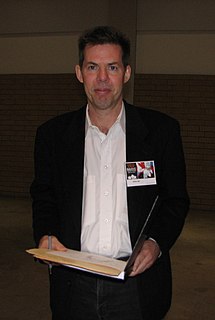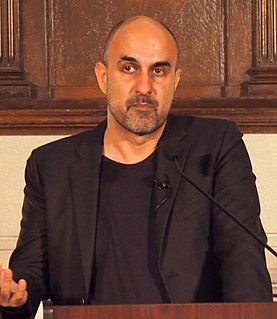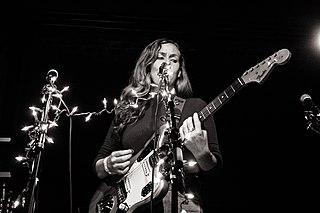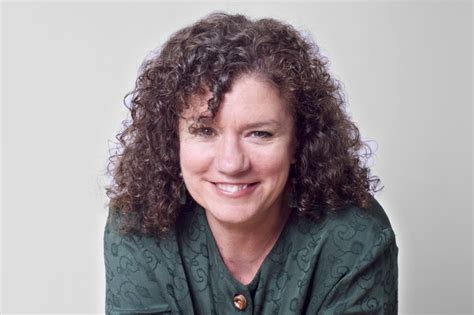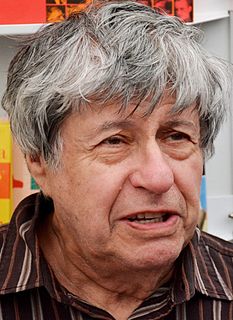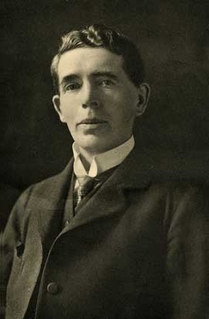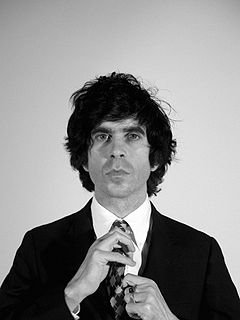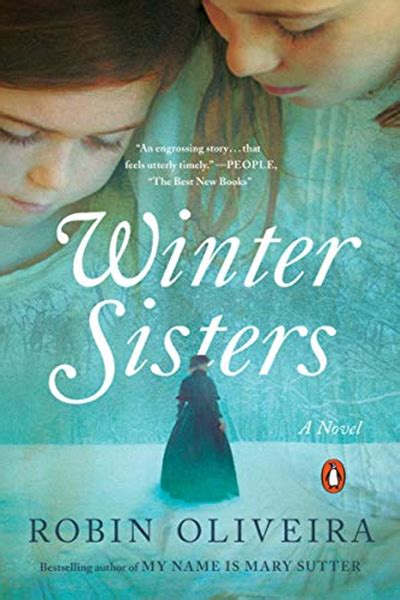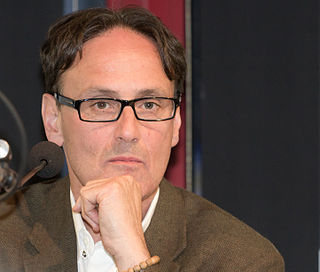Top 1200 Literary Love Quotes & Sayings - Page 3
Explore popular Literary Love quotes.
Last updated on December 11, 2024.
I would argue, for perspective's sake, that the arc of a really literary work is precisely that it both intensely reflects, and simultaneously transcends the conditions of its making. I would say that is the difference between literature and other kinds of writing. That is what the literary is - it ultimately doesn't matter what his circumstances were. And the thing that you were just saying about being sympathetic to Brontë and the fact that she could only write what she wrote when she wrote it... that's true. But look at that novel, which means so much to so many people.
Postmodern irony and cynicism's become an end in itself, a measure of hip sophistication and literary savvy. Few artists dare to try to talk about ways of working toward redeeming what's wrong, because they'll look sentimental and naive to all the weary ironists. Irony's gone from liberating to enslaving. ... The postmodern founders' patricidal work was great, but patricide produces orphans, and no amount of revelry can make up for the fact that writers my age have been literary orphans throughout our formative years.
The idea of some kind of objectively constant, universal literary value is seductive. It feels real. It feels like a stone cold fact that In Search of Lost Time, by Marcel Proust, is better than A Shore Thing, by Snooki. And it may be; Snooki definitely has more one-star reviews on Amazon. But if literary value is real, no one seems to be able to locate it or define it very well. We're increasingly adrift in a grey void of aesthetic relativism.
I think Don Henley is a brilliant contemporary rock writer. He would have been a fabulous poet if he weren't a musician. He was a literary major, and not only that - he's gifted with a brilliant voice. To me, Don could sing the New York City Yellow Pages and I'd buy it. I just love the sound of his voice.
The visual is sorely undervalued in modern scholarship. Art history has attained only a fraction of the conceptual sophistication of literary criticism. Drunk with self-love, criticism has hugely overestimated the centrality of language to western culture. It has failed to see the electrifying sign language of images.
These self-appointed deacons in the Church of Latter-Day American Literature seem to regard generosity (of words) with suspicion, texture with dislike, and any broad literary stroke with outright hate. The result is a strange and arid literary climate where a meaningless little fingernail paring like Nicholson Baker's Vox becomes an object of fascinated debate and dissection, and a truly ambitious American novel like Matthew's Heart of the Country is all but ignored.
I'm now much more excited about genre distinctions. What I still see breaking down are more the hierarchical arrangements of genres. That is, "There is literary fiction, and then there are lesser genres." I'm much more clear on the idea that literary fiction is itself a genre. It is not above other genres. It is down there in the muck with all the other genres, and it's doing the wonderful things that it does, but to give it a Y-axis, to make it high and low, just seems absurd. I stand by that.
I use biography, I use literary connections (as with Platen - this seems to me extremely helpful for appreciating the nuances of Mann's and Aschenbach's sexuality), I use philosophical sources (but not in the way many Mann critics do, where the philosophical theses and concepts seem to be counters to be pushed around rather than ideas to be probed), and I use juxtapositions with other literary works (including Mann's other fiction) and with works of music.
Literary men now routinely tell their readers about their divorces. One literary man who reviews books wrote, in reviewing a study of Ruskin, that he had never read a book by Ruskin but that the study confirmed him in his belief that he didn't want to read a book by Ruskin. This man very often writes about his family life.
In order to write about the machine you have to know it, to live with it, to love it (or hate it). I think that true writing could be done on industrial subjects by people who work in industry, who are firmly linked with it. But ... and here is the opposite 'but', the technology of literary craftsmanship is itself a very fine and complex matter. Qualified specialists from industry prove themselves dilettantes in the field of literature. The needed synthesis is not yet in sight.
If the literary category of 'mordant fable' exists at all, it may be because Brock Clarke invented it. The Happiest People in the World is everything we fans have come to love from a Clarke novel: playful and deliriously skewed, and somehow balancing between genuinely great-hearted and gloriously weird.
I want my books to exist in the literary world, not only in the art world. I am interested in having a dialogue with other writers, and the readers of those writers. Someone who is reading a book of mine might not have visited my exhibitions related to it, but can still have a full, literary experience with that book. This would be a completely different experience from stepping into the show, not having read the book. One form is not illustrative of the other.
All I am in private life is a literary critic and historian, that's my job...And I'm prepared to say on that basis if anyone thinks the Gospels are either legends or novels, then that person is simply showing his incompetence as a literary critic. I've read a great many novels and I know a fair amount about the legends that grew up among early people, and I know perfectly well the Gospels are not that kind of stuff.
First one gets works of art, then criticism of them, then criticism of the criticism, and, finally, a book on The Literary Situation , a book which tells you all about writers, critics, publishing, paperbacked books, the tendencies of the (literary) time, what sells and how much, what writers wear and drink and want, what their wives wear and drink and want, and so on.
So-called "natural language" is wonderful for the purposes it was created for, such as to be rude in, to tell jokes in, to cheat or to make love in (and Theorists of Literary Criticism can even be content-free in it), but it is hopelessly inadequate when we have to deal unambiguously with situations of great intricacy, situations which unavoidably arise in such activities as legislation, arbitration, mathematics or programming.
A critical assumption is sometimes made that [Grisham, Clancey, Crichton & myself] have access to some mystical vulgate that other (and often better) writers cannot find or will not deign to use. I doubt if this is true. Nor do I believe the contention of some popular novelists... that thier success is based on literary merit -- that the public understands true greatness in ways the tight-a**ed, consumed-by-jealousy literary establishment cannot. This idea is ridiculous, a product of vanity and insecurity.
Everybody should read fiction… I don’t think serious fiction is written for a few people. I think we live in a stupid culture that won’t educate its people to read these things. It would be a much more interesting place if it would. And it’s not just that mechanics and plumbers don’t read literary fiction, it’s that doctors and lawyers don’t read literary fiction. It has nothing to do with class, it has to do with an anti-intellectual culture that doesn’t trust art.
The amplification of our diverse literary voices is a political act of resistance. Our lives are important, too. Our lives should be represented in our literature. And that literature is vital, compelling, and accessible. That literature deserves to be disseminated and noticed and available. And with respect to the dissemination and promotion of diverse voices - librarians, educators, and editors of literary journals play such an important role. They deserve not only a hearty shout out, but also our thanks and support.
Every few seconds a new book sees the light of day. Most of them will just be a part of the hum that makes us hard of hearing. Even the book is becoming an instrument of forgetting. A truly literary work comes into being as its creator's cry of protest against the forgetting that looms over him, over his predecessors and his contemporaries alike, and over his time, and the language he speaks. A literary work is something that defies death.
I may remind you that history is not a branch of literature. The facts of history, like the facts of geology or astronomy, can supply material for literary art; for manifest reasons they lend themselves to artistic representation far more readily than those of the natural sciences; but to clothe the story of human society in a literary dress is no more the part of a historian as a historian, than it is the part of an astronomer as an astronomer to present in an artistic shape the story of the stars.
I love lyrics. I've always been averse to the straight lyric idea. I guess a big part of it is, that songs that are literary always turn me off. Because they feel so abstract. Like a song. What is a song? We have to remember what the function of a concert and the function of playing a song for people are. It's all become really abstracted.
I actually dislike, more than many people, working through literary allusion. I just feel that there's something a bit snobbish or elitist about that. I don't like it as a reader, when I'm reading something. It's not just the elitism of it; it jolts me out of the mode in which I'm reading. I've immersed myself in the world and then when the light goes on I'm supposed to be making some kind of literary comparison to another text. I find I'm pulled out of my kind of fictional world, I'm asked to use my brain in a different kind of way. I don't like that.
Today the crime novelist has one advantage denied to writers of 'straight' or 'literary' novels. Unlike them he can range over all levels of society, for crime can easily breach the barriers that exist in our stratified society. Because of these barriers the modern literary novel, unlike its 19th-century predecessors, is often confined to the horizontal, dealing only with one class. But crime runs through society from top to bottom, and so the crime novelist can present a fuller picture of the way we live now.
Through humility, soul-searching, and prayerful contemplation we have gained a new understanding of certain dogmas. The church no longer believes in a literal hell where people suffer. This doctrine is incompatible with the infinite love of God. God is not a judge but a friend and a lover of humanity. God seeks not to condemn but only to embrace. Like the fable of Adam and Eve, we see hell as a literary device. Hell is merely a metaphor for the isolated soul, which like all souls ultimately will be united in love with God.
Once in a rare while, you get to read a story of such breathtaking beauty and intelligence that you remember why you love to read. The Anatomy Lesson is just such a novel. In stunning prose, Nina Siegal animates Rembrandt's first masterpiece, spinning a deeply affecting tale of love, loss and redemption as she reveals the secrets of the human soul. It is a gorgeous literary page turner of immense sympathy and elegance, equal in artistic lan to its inspiration. Brava!
A word, and all the infinite fluctuations it may possess. Like that moment when you know you have something to say, and you know you're speaking, even, but you still have no idea how you will say it. Or the moment when, as a reader, you're reading, and you are understanding what you are reading, but still have utterly no idea what will come next for you, what precisely the author wants to say. For me, that is the ultimate level of literary depth, of literary density.
The new "ambiguity" means, in a way adjudged favorable to literary, poetic, intellectually and psychologically well-devised and praiseworthily executed linguistic performance, uncertainty of meaning, or difficulty for the interpreter in identifying just what the meaning in question is: it means the old meanings of ambiguity with a difference. It means uncertainty of meaning (of a word or combination of words) purposefully incorporated in a literary composition for the attainment of the utmost possible variety of meaning-play compressible within the verbal limits of the composition.












